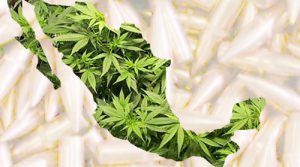Mexico: Marijuana Legalization Ignites National Debate

Since left-wing mexican politicians started talking about the marijuana legalization last July, the debate has become every-one’s business. For the last ten years, the Party of the Democratic Revolution (in Spanish, “Partido de la Revolución Democrática”, PRD) has presented four different proposals to combat drug trafficking, which suggests regulations on the production, the processing, the distribution, the selling and the consumption of cannabis.
Drug Enforcement Administration´s official statistics claimed that 47.515 assassinations have occurred in the last five years because of execution and, or gang warfare. Chamber of Deputies affirms that drug trafficking organization’s money laundering equals to US $10,000 per year, from which 90% is laundered in the USA, and the rest returns to formal Mexican economy.
In the pursuit of combating this scourge, in 2009 The Congress formally decriminalized 5 grams possession for immediate individual use in the private sphere to reduce clandestine business. At present, Mexican Government insists to decriminalize more than “legalization” because “decriminalizing implies a benefit for the consumer, for the addict, not for the supplier, for the trafficker,” Roberto Campa, deputy secretary for Prevention and Citizen Participation, said at a press conference.
People who support the initiative suggest that decriminalize consumption will help reduce violence and end drug trafficking, ensuring proportionality of sentences for convicted drug dealers; standing out –by the other hand- the cannabis as a natural analgesic. Morelos´s Governor, Graco Ramírez, expressed that “this would be an important strategic change towards reducing violence” because “if every consumer has a marijuana plant on the balcony, there would be no traffic” as Eugenio Zaffaroni – member of the Supreme Court of Justice of Argentina – said. This way, police and jurisdictional efforts won´t concentrate on individuals but on suppressing illegal trafficking, along with public treatment addiction to “take those guys out from jails and give them another option, in addiction treatment centers”, Ramírez stressed.
Among people who partially support this policy measure is the Archbishop Emeritus of Guadalajara, Juan Sandoval Íñiguez, who said that marihuana is not a hard drug and that “there are another legal drugs, like tobacco, coffee and alcohol” which trigger violent behaviors, like road accidents or domestic violence, among others.
Opponents of legalizing marijuana guarantee that there are scientific evidence that endorse hashish´s negative effects, as last National Institute of Drug Abuse´s reports show, namely decline in intellectual and cognitive abilities, loss of distance and time sense, negative effects on attention, memory and learning, etc.. However, Australian Institute of Criminology´s report rescues that the evidence of these studies is limited, since in both animals and humans, prolonged consumption no means deterioration but alterations in the behavior of some cognitive functions, the cannabionide system and its receptors.
Following this line of thought, Pope Francis said -during his visit to Rio de Janeiro- to “decriminalize the drug does not solve the drug addiction,” and it´s a must to promote “greater justice, educating young people in the values that build up life in society, accompanying those in difficulty and giving them hope for the future.”
Mexico´s measure is not the first in the world. In 1976 Netherlands legalized sale and consumption of marijuana (not the production). This initiative helped to reduce the consumption than other countries with more punitive measures, because to cultivate the drug you need an official permission, it is only authorized to sell up to 5 grams of cannabis for people over 18 years in coffee shops and consumption out of these shops is heavily punished. In addition, penalties for trafficking are high, between 4 and 12 years in prison or a fine of € 74,000. The consumer, on the other hand, cannot grow their own weed plant because, since 2012, every person has to be a member of a coffee shop to smoke it legally.
In Latin America, there is a growing number of sectors that calls for a change about policies to combat drugs. Starting from Uruguay, where last 1st August, lawmakers approved a bill that legalizes the use of marijuana, but the project must still be discussed and approved by the Senate. In other locations, such as Chile and Argentina, the focus is more prohibitive, with penalties ranging from loss of freedom to undergo detoxification therapies. Only in some European countries laws are less punitive: in Italy, Switzerland, Germany, Belgium, Spain and Portugal consumption is not criminalized, which helped differentiates hard drugs (cocaine and heroin) of soft (marijuana and hashish) and reduce drug trafficking.
In Mexico, while twists and turns, a forum organized by the Mexico City Legislative Assembly is planned for early September, where they will discuss the issue with the United Nations Office on Drugs and Crime, the Organization of American States and the World Health Organization.






